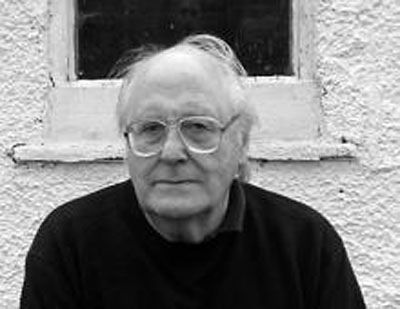|
ROY FISHER
1930-2017

Roy Fisher never became a “popular poet”, in the sense of his work
being widely known and printed in the sort of anthologies that
appeal to a broad public. I recall him once saying that he didn’t
have a “party piece” poem, the kind that he could perform regularly
and be recognised by. On the whole, his work didn’t lend itself to
being quoted from to emphasise a point of view. I think his audience
was largely confined to fellow-poets, a few informed readers of
poetry and, after a time, various academics. One or two, like Eric
Mottram, had supported him all along, but it took others some years
to catch up, if they ever did. When it came to the response to
Fisher’s work by the literary establishment generally, Donald Davie
probably got it right when he said that he was the victim of “the
blindness and condescension of the metropolis to writing which is
provincial in its origins or subject matter”.
Fisher was born in 1930 in Birmingham,
and the city, and the Midlands
generally, figured prominently in his poetry throughout his
lifetime. His early long poem,
City, published in 1961
by Migrant Press, was an example of how he could use the facts of
his background in verse that was shaped by his reading of American
and European modernist poets. It was certainly different from the
kind of poetry that was then being produced by most English writers,
and it’s perhaps significant that many of the first people to
recognise its qualities were Americans like Robert Creeley and
Denise Levertov, who wrote about Fisher in the influential American
magazine, Kulchur, in
1962.
It was Gael Turnbull who, in the early-1950s,
introduced Fisher to the work of William Carlos Williams, Creeley,
Charles Olson, and Louis Zukofsky. He also encouraged him to send
poems to Cid Corman’s magazine,
Origin.
Fisher certainly learned a great deal from reading American
poets, but he was also interested in Continental art and writing,
and he always retained his own voice and concerns. Tom Pickard made
a filmed documentary about Fisher, and it was tellingly called, Birmingham’s
What I Think With.
Most of Fisher’s early work appeared in little magazines and small
press pamphlets, though the adventurous Fulcrum Press did publish
several books by him in the 1960s. It was only in the late-1970s
that a somewhat bigger publisher, Carcanet Press, brought out one of
his books, and this was followed by his being taken up by Oxford
University Press in 1980. It gave him some status (Oxford
eventually did several books by him) but, as usual, the
London-centred literary critics and commentators largely ignored
him. Bloodaxe Books published his later collections.
He had worked in schools and colleges, and for a number of years was
a lecturer in the American Studies Department of Keele University.
Fisher was also a talented jazz pianist. He had started playing with
local jazz groups in the
Birmingham
area while still a teenager, and was influenced by what was known as
Chicago-style jazz. Pee Wee Russell and Bud Freeman were the kind of
musicians he admired. Later, he was skilled enough to be employed as
an accompanist for Bud Freeman when the American tenor-saxophonist
toured Britain. And I
recall Fisher playing with Slim Gaillard at the
Beat Dreams/Plymouth Sounds
convention in Plymouth in 1987.
I knew and liked Roy Fisher. He was a good man and a fine poet. I’m
happy that, in a small way, I was able to promote his work at a time
when very few other people were paying attention to it. I can’t make
any great claims for what I did, which amounted to a few short
reviews in Tribune and
Ambit. I also used some
of his poems in Move and
Palantir, a couple of
magazines I edited in the Sixties and Seventies. But it pleases me
to think that I knew him and valued his writing.
Jim Burns June 2017
|